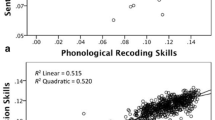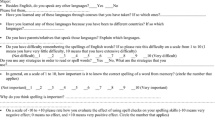Abstract
An experiment with random assignment examined the effectiveness of a strategy to learn unfamiliar English vocabulary words during text reading. Lower socioeconomic status, language minority fifth graders (M = 10 years, 7 months; n = 62) silently read eight passages each focused on an unknown multi-syllabic word that was underlined, embedded in a meaningful context, defined, depicted, and repeated three times. Students were grouped by word reading ability, matched into pairs, and randomly assigned to one of two conditions. In the strategy condition, students orally pronounced the underlined words during silent reading. In the control condition, students penciled a check if they had seen the underlined words before but did not say the words aloud. Results of ANOVAs showed that the oral strategy enhanced vocabulary learning (ps < .01), with poorer readers showing bigger effect sizes than better readers in remembering pronunciation-meaning associations and spellings of the words. In a second experiment, 32 fifth graders from the same school described the strategies they use when encountering unfamiliar words in context. Better readers reported more word-level strategies whereas poorer readers reported more text-based strategies. Our explanation is that application of the word-level strategy of decoding new words aloud strengthened connections between spellings, pronunciations, and meanings in memory compared to silent reading of new words, particularly among poor readers who were less skilled and less likely to use this strategy unless instructed to do so.


Similar content being viewed by others
References
Baumann, J. F., & Kame’enui, E. J. (2004). Vocabulary instruction: Research to practice. New York: The Guilford Press.
Beck, I. L., & McKeown, M. G. (1991). Conditions of vocabulary acquisition. In R. Barr, M. L. Kamil, P. B. Mosenthal, & P. D. Pearson (Eds.), Handbook of reading research (Vol. II, pp. 789–814). New York: Longman.
Beck, I. L., & McKeown, M. G. (1999). Comprehension: The sine qua non of reading. Teaching & Change, 6(2), 197–212.
Beck, I. L., McKeown, M. G., & Kucan, L. (2002). Robust vocabulary instruction: Bringing words to life. New York: The Guilford Press.
Beck, I. L., McKeown, M. G., & Omanson, R. C. (1987). The effects and uses of diverse vocabulary instructional techniques. In M. G. McKeown & M. E. Curtis (Eds.), The nature of vocabulary acquisition (pp. 147–163). Hillsdale, NJ: Erlbaum.
Biemiller, A., & Slonim, N. (2001). Estimating root word vocabulary growth in normative and advantaged populations: Evidence for a common sequence of vocabulary acquisition. Journal of Educational Psychology, 93, 498–520.
Bowey, J. A., & Miller, R. (2007). Correlates of orthographic learning in third-grade children’s silent reading. Journal of Research in Reading, 30, 115–128.
Bowey, J. A., & Muller, D. (2005). Phonological recoding and rapid orthographic learning in third-graders’ silent reading: A critical test of the self-teaching hypothesis. Journal of Experimental Child Psychology, 92, 203–219.
Chall, J., Jacobs, V., & Baldwin, L. (1990). The reading crisis. Cambridge, MA: Harvard University Press.
Clay, M. M. (1991). Becoming literate: The construction of inner control. Auckland, New Zealand: Heinemann.
Cohen, J. (1988). Statistical power analysis for the behavior sciences (2nd ed.). Hillsdale, NJ: Erlbaum.
Cunningham, A. (2005). Vocabulary growth through independent reading and reading aloud to children. In E. Hiebert & M. Kamil (Eds.), Teaching and learning vocabulary: Bringing research to practice (pp. 45–68). Mahwah, NJ: Lawrence Erlbaum Associates.
Cunningham, A. (2006). Accounting for children’s orthographic learning while reading text: Do children self-teach? Journal of Experimental Child Psychology, 95, 56–77.
Cunningham, A. E., Perry, K. E., Stanovich, K. E., & Share, D. L. (2002). Orthographic learning during reading: Examining the role of self-teaching. Journal of Experimental Child Psychology, 82, 185–199.
de Jong, P. F., Bitter, D. J. L., & van Setten, M. (2009). Does phonological recoding occur during silent reading, and is it necessary for orthographic learning? Journal of Experimental Child Psychology, 104, 267–282.
de Jong, P., & Share, D. (2007). Orthographic learning during oral and silent reading. Scientific Studies of Reading, 11, 55–71.
Ehri, L. (1978). Beginning reading from a psycholinguistic perspective: Amalgamation of word identities. In F. Murray (Ed.), The development of the reading process (pp. 1–33). International Reading Association Monograph (No. 3). Newark, DE: International Reading Association.
Ehri, L. (1980). The development of orthographic images. In U. Frith (Ed.), Cognitive processes in spelling (pp. 311–338). London, England: Academic Press.
Ehri, L. (1992). Reconceptualizing the development of sight word reading and its relationship to recoding. In P. Gough, L. Ehri, & R. Treiman (Eds.), Reading acquisition (pp. 107–143). Hillsdale, NJ: Erlbaum.
Ehri, L. (1998). Grapheme-phoneme knowledge is essential for learning to read words in English. In J. Metsala & L. Ehri (Eds.), Word recognition in beginning literacy (pp. 3–40). Mahwah, NJ: Erlbaum.
Ehri, L. (2005). Development of sight word reading: Phases and findings. In M. Snowling & C. Hulme (Eds.), The science of reading, a handbook (pp. 135–154). Oxford, UK: Blackwell.
Ganske, K. (2000). Word journeys: Assessment-guided phonics, spelling, and vocabulary instruction. New York: Guilford Publications.
Goodman, K. (1976). Reading: A psycholinguistic guessing game. Journal of the Reading Specialist, May, 126–135.
Goswami, U., Ziegler, J., & Richardson, U. (2005). The effects of spelling consistency on phonological awareness: A comparison on English and German. Journal of Experimental Child Psychology, 92, 345–365.
Graves, M. (2006). The vocabulary book. New York: Teacher’s College Press.
Hart, B., & Risley, T. (1995). Meaningful differences in the everyday experiences of young American children. Baltimore, MD: Brookes.
Henriksen, B. (1999). Three dimensions of vocabulary development. Studies in Second Language Acquisition, 21, 303–317.
Hiebert, E. H., & Kamil, M. L. (2005). Teaching and learning vocabulary: Bringing research to practice. Mahwah, NJ: Lawrence Erlbaum Associates.
Juel, C. (1980). Comparison of word identification strategies with varying context, word type, and reader skill. Reading Research Quarterly, 15, 358–376.
Juel, C., & Minden-Cupp, C. (2000). Learning to read words: Linguistic units and instructional strategies. Reading Research Quarterly, 35, 458–492.
Kame’enui, E. J., Dixon, R. C., & Carnine, D. W. (1987). Issues in the design of vocabulary instruction. In M. G. McKeown & M. E. Curtis (Eds.), The nature of vocabulary acquisition (pp. 129–146). Hillsdale, NJ: Erlbaum.
Kyte, C., & Johnson, C. (2006). The role of phonological recoding in orthographic learning. Journal of Experimental Child Psychology, 93, 166–185.
Moss, B. (2004). Teaching expository text structures through information trade book retellings. Reading Teacher, 57, 710–718.
Nagy, W. E., Anderson, R. C., & Herman, P. A. (1987). Learning word meanings from context during normal reading. American Educational Research Journal, 24, 237–270.
Nation, K., Angell, P., & Castles, A. (2007). Orthographic learning via self-teaching in children learning to read English: Effects of exposure, durability, and context. Journal of Experimental Child Psychology, 96, 71–84.
National Reading Panel. (2000). Report of the national reading panel: Teaching children to read: An evidence-based assessment of the scientific research literature on reading and its implications for reading instruction: Reports of the subgroups. Rockville, MD: NICHD Clearinghouse.
Perfetti, C., & Hart, L. (2001). The lexical basis of comprehension skill. In D. Gorfein (Ed.), On the consequences of meaning selection: Perspectives on resolving lexical ambiguity. Washington, DC: American Psychological Association.
Perfetti, C., & Hart, L. (2002). The lexical quality hypothesis. In L. Verhoeven, C. Elbro, & P. Reitsma (Eds.), Precursors of functional literacy. Amsterdam/Philadelphia: John Benjamins.
Pressley, M., Levin, J., & McDaniel, M. (1987). Remembering versus inferring what a word means: Mnemonic and contextual approaches. In M. G. McKeown & M. E. Curtis (Eds.), The nature of vocabulary acquisition (pp. 107–127). Hillsdale, NJ: Erlbaum.
Reitsma, P. (1983). Printed word learning in beginning readers. Journal of Experimental Child Psychology, 36, 321–339.
Rosenthal, J., & Ehri, L. (2008). The mnemonic value of orthography for vocabulary learning. Journal of Educational Psychology, 100, 175–191.
Ryder, J., Tunmer, W., & Greaney, K. (2008). Explicit instruction in phonemic awareness and phonemically based decoding skills as an intervention strategy for struggling readers in Whole Language classrooms. Reading and Writing: An Interdisciplinary Journal, 21, 349–369.
Sadoski, M. (2005). A dual coding view of vocabulary learning. Reading and Writing Quarterly, 21, 221–238.
Samuels, S. J. (2002). Reading fluency: Its development and assessment. In A. E. Farstrup & S. J. Samuels (Eds.), What research has to say about reading instruction (3rd ed., pp. 166–183). Newark, DE: International Reading Association.
Senechal, M. (1997). The differential effect of storybook reading on preschoolers’ acquisition of expressive and receptive vocabulary. Journal of Child Language, 24, 123–138.
Share, D. (1995). Phonological recoding and self-teaching: Sine qua non of reading acquisition. Cognition, 55, 151–218.
Share, D. (1999). Phonological recoding and orthographic learning: A direct test of the self-teaching hypothesis. Journal of Experimental Child Psychology, 72, 95–129.
Share, D. (2004). Orthographic learning at a glance: One the time course and developmental onset of self-teaching. Journal of Experimental Child Psychology, 87, 267–298.
Share, D. (2008). On the Anglocentricities of current reading research and practice: The perils of overreliance on an “outlier” orthography. Psychological Bulletin, 134, 584–615.
Share, D., & Shalev, C. (2004). Self-teaching in normal and disabled readers. Reading and Writing: An Interdisciplinary Journal, 17, 769–800.
Smith, F., & Goodman, K. S. (2008). “On the psycholinguistic method of teaching reading” revisited. Language Arts, 86, 61–65.
Snow, C., Burns, M., & Griffin, P. (1998). Preventing reading difficulties in young children. Washington, DC: National Academic Press.
Stanovich, K. (1986). Matthew effects in reading: Some consequences of individual differences in the acquisition of literacy. Reading Research Quarterly, 21, 360–407.
Stanovich, K. (2000). Progress in understanding reading: Scientific foundations and new frontiers. New York: Guilford.
Sternberg, R. J. (1987). Most vocabulary is learned from context. In M. G. McKeown & M. E. Curtis (Eds.), The nature of vocabulary acquisition (pp. 89–105). Hillsdale, NJ: Erlbaum.
Swanborn, M. S. L., & deGlopper, K. (1999). Incidental word learning while reading: A meta-analysis. Review of Educational Research, 69, 261–285.
Thorndike, E., & Lorge, I. (1972). The teachers word book of 30,000 words. New York: Teachers College Press.
Tunmer, W. E., & Chapman, J. W. (1993). To guess or not to guess, that is the question: Metacognitive strategy training, phonological recoding skill, and beginning reading. Reading Forum N.Z., 1, 3–14.
Tunmer, W. E., & Chapman, J. W. (2002). The relation of beginning readers’ reported word identification strategies to reading achievement, reading-related skills, and academic self-perceptions. Reading and Writing: An Interdisciplinary Journal, 15, 341–358.
Tunmer, W. E., & Chapman, J. W. (2003). The reading recovery approach to preventive early intervention: As good as it gets? Reading Psychology, 24, 337–360.
Williams, K. (1997). Expressive vocabulary test. Circle Pines, MN: American Guidance Service.
Woodcock, R. (1987). Woodcock reading mastery tests-revised. Circle Pines, MN: American Guidance Service.
Author information
Authors and Affiliations
Corresponding author
Rights and permissions
About this article
Cite this article
Rosenthal, J., Ehri, L.C. Pronouncing new words aloud during the silent reading of text enhances fifth graders’ memory for vocabulary words and their spellings. Read Writ 24, 921–950 (2011). https://doi.org/10.1007/s11145-010-9239-x
Published:
Issue Date:
DOI: https://doi.org/10.1007/s11145-010-9239-x




